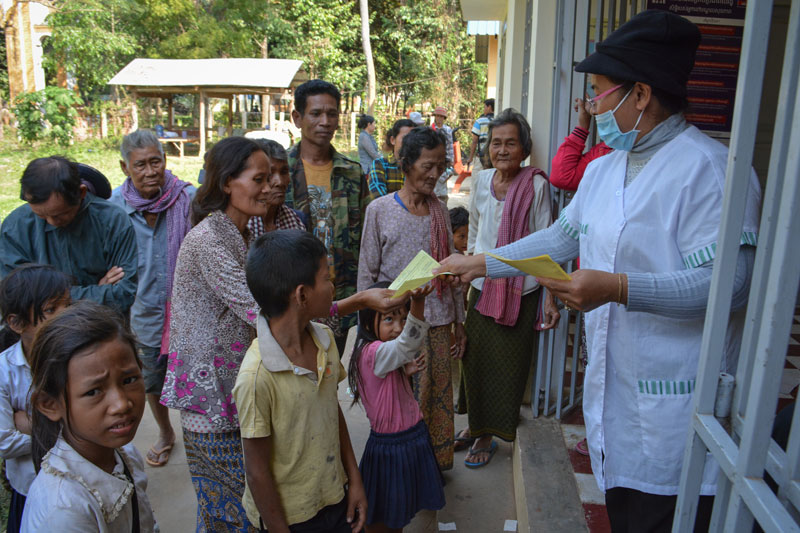ROKA COMMUNE, Battambang province – As at least 16 more villagers here tested positive for HIV Wednesday—bringing the total number of positive tests over the past week above 100—provincial police began questioning the unlicensed doctor whom villagers suspect of spreading the virus.
About 105 villagers, including 19 children, have now been found to be infected with HIV since the Roka commune health center began preliminary testing for the virus on December 8, creating a public health panic with little precedent in the country, which has been largely successful in curbing an HIV/AIDS epidemic that peaked in the late 1990s.

Ninety of the patients who have tested positive in initial tests at the commune health center over the past week had a second test at the provincial referral hospital Wednesday and 89 cases were confirmed, according to Mean Chhi Vun, director of the Health Ministry’s National Center for HIV/AIDS, Dermatology and STD (NCHADS).
Many villagers are blaming Yem Chrin, an unlicensed doctor who frequently made house calls to many of the commune’s 8,897 residents, for the outbreak, said Hea Sik, head of the Health Ministry’s HIV/AIDS program in Sangke district.
Seng Luch, provincial penal police chief, said that Mr. Chrin had willingly gone to the provincial police office for questioning Wednesday afternoon.
“We invited him for questioning because many people accused him of causing the spread of HIV,” Mr. Luch said. “Right now, we don’t dare to accuse him yet. We are still investigating him further.”
Mr. Luch added that police planned to detain Mr. Chrin overnight and carry out a search of his home today.
Mr. Chrin, who is in his 50s, fled the commune once the local health center, located steps away from his home, began returning positive HIV test results to angry villagers, according to Beng Sor, the health center’s director.
Chhem Choeun, Mr. Chrin’s son-in-law, said outside the family’s home Wednesday that commune police had warned his father-in-law not to return to the area.
“The commune police told him not to be at our house,” Mr. Choeun said. “They told him they were afraid upset villagers would cause violence.”
Mr. Choeun said his father-in-law, who received training as a doctor at refugee camps along the Thai-Cambodian border during the 1980s, treated villagers in the commune for an array of illnesses.
“He’s been helping people for more than 20 years,” he said. “I don’t know if it’s true or not [that he spread HIV], but the villagers trusted him. He is a good person.”
Im Chetra, Sangke district director of operational health, said outside the commune health center Wednesday that Mr. Chrin was operating without a medical license.
“He is not licensed,” he said. “If I had known about him before, I would not have let him treat people in Roka commune.”
More than 200 villagers were tested for HIV Wednesday at the local health center and at least 16 tested positive, according to Mr. Chetra, who had not finished tallying the results as of the evening.
The majority of villagers exited the center with relief on their faces, while an unfortunate few broke down crying.
“Me and my husband went for blood tests and the result was positive for both of us,” said Lap Loeut, 55, as she wiped away tears with her scarf. “I’m very scared.”
Ms. Loeut said her husband often relied upon Mr. Chrin to treat his illnesses, sometimes through injections.
“I suspect it is because of him [Mr. Chrin],” she said, gathering herself. “He made my husband become [HIV] positive.”
But Tuy Toeun, 40, another patient of Mr. Chrin, defended the unlicensed doctor Wednesday after receiving a negative result herself and a positive result on the test of her 20-year-old daughter.
“I am shocked at hearing that my daughter got a positive,” she said. “H[Mr. Chrin] is a good doctor.”
Ms. Toeun said Mr. Chrin treated her daughter after she gave birth about five months ago, injecting her with medicine and setting up an intravenous drip to rehydrate her—all with new needles that were taken out of packaging.
“It is difficult to suspect him [Mr. Chrin],” she said.
Looking for other causes of the outbreak, other villagers have pointed to a vaccination program for children that was carried out by medical workers at the commune health center on the orders of the Ministry of Health about six months ago.
But Mr. Chetra, the district health director, said the vaccinations were done in a sterile setting, adding that Mr. Chrin had nothing to do with the program.
“The health center has never cooperated with him,” he said. “We injected the vaccinations ourselves.”
“It’s unbelievable that this has happened,” he added. “I can’t say yet specifically what caused it.”
Mr. Sor, chief of the Roka commune health center, also defended staff there from being the possible source of the virus.
“This information that the vaccinations may have spread HIV are coming from the people and they don’t know the technical aspects,” he said at the center, displaying an example of the needles used for the program. “We just use the needle once and throw it away.”
Mr. Sor said villagers suspected Mr. Chrin of using one needle to treat multiple patients.
Roka commune chief Sim Pov said villagers often used Mr. Chrin as their doctor out of convenience.
“People used him because he was cheap,” she said. “And because it is normal for the villagers to use private doctors who will visit their homes.”
As part of the government’s ongoing investigation, the Ministry of Health will soon hand out a questionnaire to villagers here, said Mr. Chhi Vun, director of NCHADS.
“The investigating is ongoing,” he said, adding that the survey may include a question asking if villagers were treated by Mr. Chrin.
“It takes time to get quality evidence. We can’t say if it’s because of one person or not, because we don’t know.”



